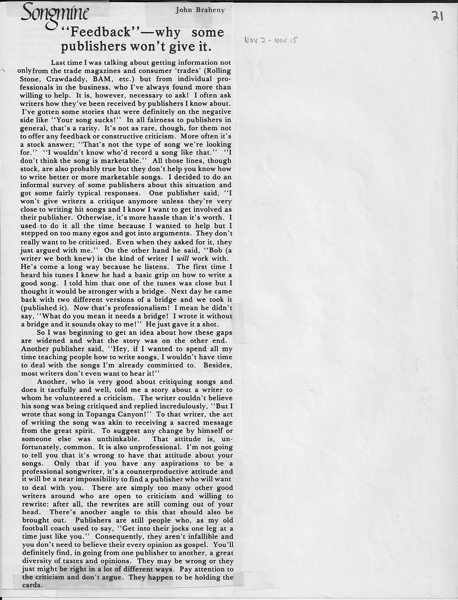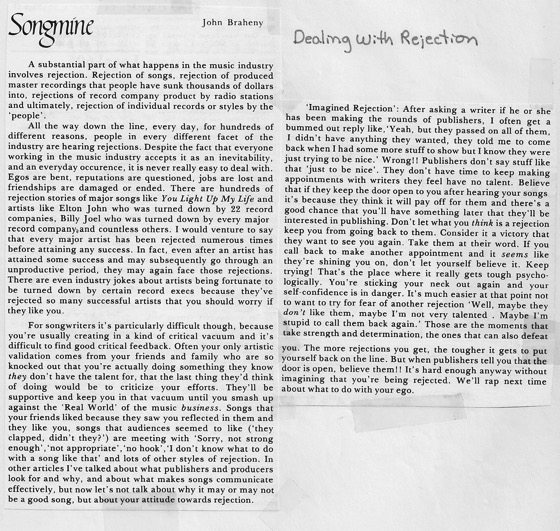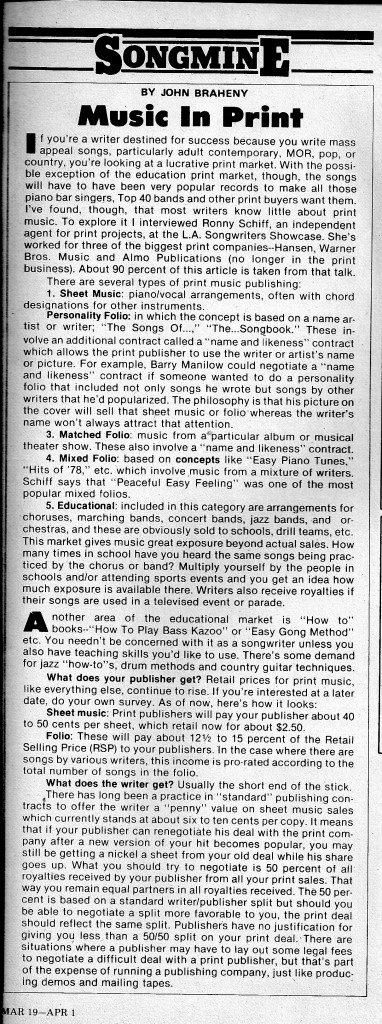Let’s assume that you’ve found a lyricist and/or composer whose words or music feel like the magic ingredient you need to write great songs. You find that you can work well together and, first thing you know, you’ve got a fantastic song. You say, “Great, let’s find a publisher!” Your partner says, “Oh, I guess I forgot to tell you, I’ve got my own publishing company so I’d like to publish the song.” At that point the song may be in trouble. You may rightfully ask whether your partner’s company is capable of properly promoting the song. Does the company have the connections to get the song recorded? You’re better off not having a publisher at all than to have the song tied up with an inadequate one. At least you’d be free to place the song with a good publisher.
If you find yourself in this situation, you might request that if your partner’s company doesn’t get the song recorded in six months or a year, that he give up his publishing interest and the two of you look for a publisher together. You might also set up your own company and split the publishing, but jointly agree to the time limit. Or you may agree to bring in a third publisher at which point you both will give an equal share of the publishing (or all of it) to the new party.
THE SPLITS
You also need to agree on a division of the writer’s share of the royalties. Your collaborator may have supplied a title for a song but you wrote the rest of it. You might feel you did most of the work and should get 90 percent of the money. Your partner may feel that without the title, which supplied the premise, there wouldn’t be a song. You may both be right but that kind of bickering could destroy a very promising collaborative effort. It’s generally agreed that if you get together with the intention of writing a song or to establish an ongoing writing relationship, you split the writers’ royalties 50/50.
Without a written agreement to the contrary, all rights and percentages are split equally. Each writer owns an equal portion of the copyright and each of the writers is empowered to grant a license to anyone who wants to record it.
If one of you is a lyricist and the other writes music, it’s a pretty straightforward arrangement. It tends to get a little touchy if each of you write music and lyrics or if the contributions are more difficult to quantify. There’s more room for argument about who contributed the most. That’s why it’s always best to agree on equal shares ahead of time.
On some of the Lennon/McCartney tunes, one undoubtedly contributed more than the other on individual songs or wrote them himself, but they just didn’t want to fight over it every time so they divided the royalties equally.
Here are some other possible situations you may have to deal with:
1. You’ve written the song and you take it to someone else to “tighten it up” and that person contributes a new hook or changes the song’s direction. How much writer credit will he get? At the time you bring your song to the writer you should try to work it out based on what you want him to contribute.
2. You take your song to an artist who wants to “personalize” it and changes something. For this he wants writer’s credit. This is a very common and potentially volatile situation, with several factors to weigh:
1. Is this an important cut? With an established artist there’s no question about it. But even with a new artist the song could be a major hit or end up on a hit album. Any recording credit may therefore be important to you.
2. How extensive are the changes “Personalizing” the song by changing a “she” to a “he” does not warrant a writer’s credit. If the artist wants more extensive changes and you want to accommodate him, offer to make them yourself. Get as much information as you can about what the artist is looking for and present several rewrites. If the artist seems unreasonably resistant to your changes, you have to face the reality that you may lose the cut unless you allow him to rewrite or just give him the credit. You can swallow your pride and walk to the bank, walk away with your pride (and your empty pockets), or tell the artist you can’t change this song but suggest that you write something together from scratch. If it’s just a matter of financial incentive for the artist to record the song, you also have the publisher’s share of the royalties to offer if you publish the song yourself.
3. How badly does the artist want the song? If he thinks it’s good enough he’s torn between wanting the writing credit and money and possibly blowing a potential hit. You’re in the same position, too, except that you may also be motivated by anger that someone would have the huevos to demand credit for your work.
While many artists wouldn’t think of asking for undeserved credit (and royalties), others do it in a New York minute. You ultimately have to decide whether it’s worth it to your career to give up a portion of those royalties and credits.
3. A publisher suggests changes and wants a writer’s credit. Generally speaking, this is the publisher’s job, and she shouldn’t ask. It would depend, of course, on how substantial the contribution is and it can get a little touchy, but it should be your decision.
4. Maybe you decide later that for some reason you want a new lyric to a song you’ve already written with someone. Is it okay to change? Not without your co-writer’s written permission.
5. What if your melody writer or publisher wants a new foreign language lyric? Do you still get paid? A decision has to be made whether you’re going to say, ‘words and music by _______, or words by _____ and music by ______. In the former, if a foreign sub-publisher wants to commission a lyric translation, the percentage granted to the translator comes out of both your royalties equally. In the latter, it’s deducted from the lyricists half. In the former, if you’re sued for lyric infringement, you both get sued. In that latter, the lyricist gets sued. In the former, if there’s a successful instrumental version of the song, both writers get paid, in the latter, the lyricist doesn’t. In the former, if a lyric is reprinted, you both get paid, in the latter, only the lyricist. Note that all these are also vice-versa and know that these questions can be worked out contractually.
All these potential problems point to the need for collaborators to get all the business straight before they get into the music. There are few things more frustrating than knowing you’ve written a winner but can’t do anything with it.
PRELIMINARY BUSINESS MEETING
K.A. Parker is a professional lyricist, a five-time American Song Festival winner, and former staff writer for Motown’s Stone Diamond Music who has taught lyric writing at UCLA, Musician’s Institute and throughout the US. Her suggestions for conducting a business meeting and list of considerations for collaborators (which she uses in her classes) is the best I’ve seen and, with her permission, I offer them to you minus the more extensive discussions of the ones I’ve already covered.
CONDUCTING THE BUSINESS MEETING
Setting up a business meeting is like buying fire insurance: you may not think you need it until it’s too late. The things that you’ll be discussing will only be necessary if and when the songs you write with your collaborator turn out to be good enough to be published, recorded, and released. Of course, there’s no way to know this until you actually start working together. But, assuming you believe in your own potential, and in that of your collaborator (and there’s no reason to work with another person unless you do), I am going to assume that you agree that a meeting of the minds on business matters is necessary before you begin work on music matters.
Don’t fall into the trap of thinking that just because your potential collaborator is “nice,” that ironing out the business will be a snap later on. Most of us are “nice” when we are trying to impress others. But greed does amazing things to people and business is about money, after all. Ego, dreams, and money make a powerful brew. Many successful songwriters have ended up giving their royalty income to the lawyers who were left to sort out the disagreements between two “nice,” talented people.
The business meeting has three basic rules:
1. Never conduct a business meeting at the same time as a creative meeting. You’ll need to be organized, closed, and tough to do business. You’ll need to be flexible, open, and childlike to be creative. Don’t try to be both at the same time — it won’t work. Conduct your business in a neutral place, like a coffee shop, on a day when you’re not planning to write together. Sharing a meal is a nice idea. It softens the whole affair, limits the time frame (usually not more than an hour), and makes it easy to exit if you see that it’s not going well. Of course, if things do go well, it helps to bond the relationship, too.
2. Come prepared. You may very well end up educating your new partner if she is less informed about the business than you are. Make copies of information you want her to read. Back up your opinion with resources. Take notes or tape the meeting for future reference. Make a checklist or agenda of the items you want to discuss. Be prepared to draw a letter of agreement for signature at a later date, based on the discussion. A business meeting is not a good time to be under the influence of alcohol or drugs of any kind. Have your drink when the meeting is over.
3. Go in with a positive attitude. Don’t enter the meeting with tales about how you got screwed before and you’re doing this to protect yourself. Assume good will and go from there. You’re building a team and every team needs goals, guidelines, regulations, and direction. Don’t be defensive. More than anything, the session should be an information-gathering interview. If you conduct it well, it should save you from any hostile confrontations in the future.
SPECIFICS
Now that you know the rules, what specifics do you discuss? Here’s a list. You may want to eliminate some of these points or include some of your own, but all the basics are here:
1. Is your information current – name, address, phone numbers, Social Security number, birth date and affiliation (ASCAP, BMI, SESAC) on your partner? This will go in your files and be used when you fill out the copyright forms on your songs. The minute you create a copyright (i.e., a song) together, you must keep up to date on this information. I remember vividly how I felt when a publisher wanted a song of mine badly, but finally passed when my collaborator could not be found. Most publishers will not be interested in publishing half a song. Keep in touch! Note: I wait until I know I want to work with someone before I ask for his/her address and Social Security number. Some people may be touchy about giving this info to a new acquaintance.
2. How does your partner feel about publishing? Does he have his own publishing company? Is it active? Does he want your publishing as well? How does he feel about working with the major publishers if they offer a contract on the tune? Is he interested in working with a small, untried publishing company?
3. Does your partner have aspirations to be a recording artist? Do you? Will either of you want to keep all the best songs for yourself? This is a source of major conflict with many collaborators and should be thoroughly discussed before the work begins. There is nothing more frustrating than holding back a great song on the chance that your partner might get signed — or seeing all your best songs go to another person, if you’re the one with artistic aspirations. Be frank about this issue.
4. When is a song completed? Ideally, it’s when BOTH of you say so. That’s okay if one of you isn’t a perfectionist or a procrastinator. Clashes of temperament will be a sore spot here unless you come up with a set of rules about this. What if you disagree? How many times do you rewrite after a critique session? After the demo is complete, will you be willing to go back in and make major changes?
5. How prolific are you? How prolific is your partner? If one of you writes every day and one of you only writes when you’re inspired, that can be very frustrating for the more prolific of the two. Do you or your partner need deadlines? Pressure? How long will you give a lyric or melody to your partner before you expect to see some activity on his part? What do you do when one of you wants the song finished and the other one doesn’t want to finish it, or can’t?
6. When do you bring in a third party to work on the song? Who will you bring in? Ideally, it’s when you both agree you’ve reached a dead end. Again, in an ideal situation, it should be a mutually agreed-upon third party. But you need to discuss this thoroughly. Never bring in a third party to work on a song without telling your partner. You’d be surprised how often this is done and it usually means the end of the partnership.
7. What about splits? This is a major bone of contention in many relationships where one party writes both words and music and the other party only writes one or the other. Professional writers split everything right down the middle, no matter who does what. When a third party is called in, everything is divided into thirds.
8. What about demos? Where do you do them? Who decides which songs to do? Who pays for them and how? Who produces, engineers, plays, sings? Generally, the fees are split exactly like the song, 50/50. But what if one partner owns a studio and can play all the instruments, etc.? Does he charge the other partner for the demo costs? This is an individual matter and both parties should agree with whatever arrangement is made, regardless of how they work it out.
9. What connections do each of you have? Would either of you feel comfortable in using them? Is one of you more aggressive? Do either of you go to LA, New York, or Nashville on a regular basis? How will you get your songs heard by publishers, producers, or artists? Do either of you belong to professional organizations such as the Nashville Songwriters Association, The Songwriters Guild or Taxi? Would either of you be willing to join to get professional feedback, pitch songs to producers and publishers and so forth? Most partnerships without goals die quickly. Once you spend the time and money required to write and demo your songs – then what? Are either of you prepared to move to LA, Nashville, or New York to better promote your work?
10. How do each of you feel about songwriting competitions? Who pays the entry fee and how will the winnings be split?
Creating music successfully with your partner will depend on the flexibility and willingness to work things out that each of you brings to the relationship. If the songs you produce are great, the incentive to work out the snags will be greater. It might help if you adopt the belief that people are more important than songs. If you don’t believe that, then maybe you should write alone.
I highly recommend you download my Sample Collaboration Contract.



